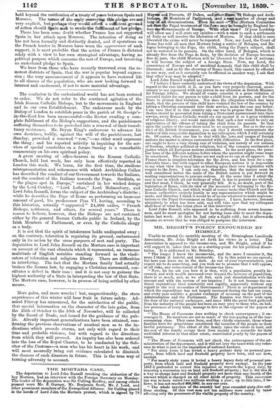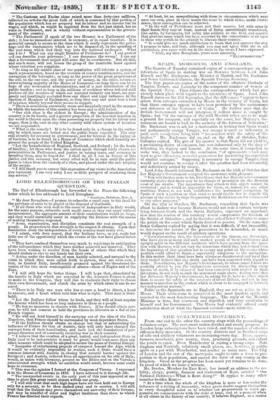MR. BRIGHT'S POLICY EXPOUNDED BY HIMSELF.
Unable to attend the monthly meeting of the Birmingham Landlords Association, Mr. John Bright set forth his views in a letter. The Association is opposed to the income-tax, and Mr. Bright, asked if he will support it, takes that tax as a starting-point for his political disser. tation. It is addressed to Mr. Brierley. " The longer I know the income-tax, and the more I examine it, the more I think it hateful and intolerable. Up to this point we are agreed ; but here you leave Inc in the dark. As one of your representatives, you expect me to do something, and you wish me to promise that I will oppose, at all risks, any reenactment of the income-tax laws.
" Now, let me ask you how it is that, with a population greatly in- creased, and with wealth increased even beyond the increase of population, there is so much, and, as we all feel, such just dissatisfaction with the amount and with the system of our taxation ? Is it not because the na- tional expenditure rises constantly and rapidly, apparently without any regard to the real necessities of Government There is no department in which the expenditure has not largely increased during the last ten years, and every year exhibits a greater contempt of economy on the part "of the Administration and the Parliament. The Russian war threw wide open the door of the national exchequer, and since 1854 the great fund gathered from the industry of the people has been an easy prey to those who, on hol- low pretences of every kind, manage to live at the expense of the payers of taxes.
" The House of Commons does nothing to check extravagance ; it en- courages it. Its members are not so much of the tax-paying as of the tax- consuming class. They come from, and they chiefly represent, those whose families have for generations considered the taxation of the people as their lawful patrimony. The eldest of the family takes the estate in land, and the rest of the family occupy their lives mainly in a scramble for their undivided interest in that other estate, contributed yearly by the payers of taxes.
" The House of Commons will not check the extravagance of the ad- ministration of the department, and it will not levy the taxes with any refer- ence to what is just in the imposition of national burdens. " For sixty years it has levied a heavy probate duty on personal pro- perty, from which land and freehold property have been, and are now, exempt. " For nearly sixty years it levied a heavy legacy duty off personal pro- perty, from which land and freehold property were exempt. In the year 1853 it pretended to correct this injustice as regards the legacy duty, by imposing a succession tax on land and freehold property ; but it did this in a way to charge land and freehold property not more than one, fourth of the amount which is charged on all other kinds of property. This succession tax was to have raised two millions sterling a year ; up to this time, 'I be- lieve, it has not reached 800,0001. in any one year. " The whole taxation of the country last year exceeded sixty-five mil- lions sterling. Of this vast sum not ten millions were raised by taxes affecting only the possessors of the visible property of the country. " The Customs and Excise alone raised more than forty-two millions, collected on articles the great bulk of which is consumed by that portion of the population which has no property but its labour and no income but its wages, and which, as might be expected from the fact just stated, has no voice in Parliament, and is wholly without representation in the govern- ment of the country.
" The Parliament (I speak of the two Houses) is a Parliament of the rich; it has no immediate interest in economy, or in equal taxation. It is powerful enough to secure to the class which it really represents the patro- nage and the emoluments which are to be disposed of, in the spending of the vast sums which find their way into the national exchequer. What can I do ? What can any single Member of Parliament do ? I can protest —I can describe your grievance ! I can denounce the wrong ! I can say that a Government thus unjust will some day be overthrown. But all this, and much more, will not loosen the grasp of the insatiable hand against -whose extortion you complain. "So long as the middle class of our population will tolerate a system of mock representation, based on the coercion of county constituencies, and the corruption of the boroughs ; so long as the power of the great proprietors of the soil, in the one case, and the power of money, in the other, return an overwhelming majority of the House of Commons—so long there can be no hope of any economical administration, and of a just distribution of the public burden; and so long as the millions of workmen whose toil and skill produce all the wonders of which our national industry can boast, are pur- posely and insultingly excluded from any direct and legal influence in the election of Members of Parliament, so long they may and must bear a load of taxation wholly beyond their means to support.
"There is something essentially mean and singularly cruel in the manner in which the taxation of this country has been and is still levied. " Our rich class is the richest in Europe ; the administration of the country is in its hands, and a greater proportion of the heaviest taxation in the world is thrown upon the class possessing no property but its labour and wages, than is the case in any other country with whose system of taxation we are acquainted.
" What is the remedy ? It is to be found only in a change in the autho- rity by which taxes are levied and the public funds expended. The only real security for economy in government, and for fairness in the laying on of burdens, is to be found in a House of Commons which shall honestly re- - present the people of the United Kingdoni.
"Let the householders of England, Scotland, and Ireland ; let the heads of families ; let those who form the nation speak through fairly chosen re- presentatives in Parliament, and justice in raising taxes, and economy in spending them, may be hoped for. I shall do all I can in favour of this justice and this economy, but every effort will be in vain until the public purse is taken from the custody of a class, and placed under the safe keeping of the people. " I will thank you to convey this expression of my views to the Association you represent. I am very sorry I see so little prospect of rendering them any service."



































 Previous page
Previous page